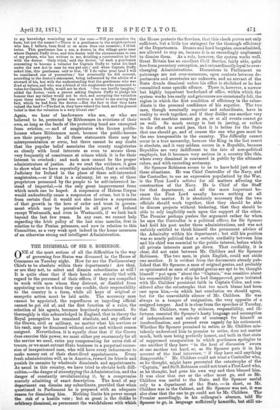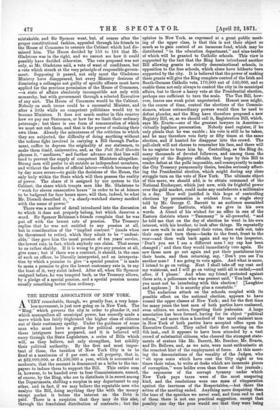THE DISMISSAL OF SIR S. ROBINSON.
ONE of the most serious of all the difficulties in the way of governing free States was discussed in the House of Commons on Tuesday night. How far are the Parliamentary Chiefs to be absolute within their departments ? Are they, or are they not, to select and dismiss subordinates at will ? It is quite clear that if their hands are strictly tied with regard to the personnel of their offices, if they are compelled to work with men whom they distrust, or disabled from appointing men in whom they can confide, their responsibility to the country is a form, while all hope of original or energetic action must be laid aside. The necessary man cannot be appointed, the superfluous or impeding official cannot be got rid of, and the first function of a ruler, the selection of his agents, becomes hopelessly embarrassed. So thoroughly is this acknowledged in England, that in theory the Royal prerogative has remained absolute, and any officer of the Crown, civil or military, no matter what his services or his rank, may be dismissed without notice and without reason assigned. Nevertheless, it is equally clear that if the Crown does exercise this power, we must either pay enormously for all the service we need, extra pay compensating for extra risk of tenure, or we mast entrust State business to a perpetual succes- sion of inexperienced men, who will have every inducement to make money out of their short-lived appointments. Every fresh administration will, as in America, reward its friends and punish its enemies by wholesale dismissals and appointments. As usual in this country, we have tried to obviate both diffi- culties,—the danger of stereotyping the Administration, and the danger of constantly revolutionizing it, by a compromise scarcely admitting of exact description. The head of any department can dismiss any subordinate, provided that when questioned in Parliament he is prepared with an adequate reason for dismissing him. Nothing limits his power except the risk of a hostile vote ; but so great is the dislike to arbitrary dismissal, so permanent the watchfulness with which the House protects the Services, that this check proves not only sufficient, but a little too stringent for the thorough efficiency of the Departments. Drones and hard bargains, once admitted, are allowed to stay on, because it is so exceedingly unpleasant to dismiss them. As a rule, however, the system works well. Great Britain has an excellent Civil Service, fairly able, quite free from pecuniary corruption, and extraordinarilyloyal to ever- changing Administrations. Discussions in Parliament on patronage are not over-numerous, open contests between de- partments and secretaries are unknown, and no servant of the State dreads dismissal unless his office is abolished or he has committed some specific offence. There is, however, a narrow but highly important borderland of office, within which the system works less easily and grievances are occasionally felt, the region in which the first condition of efficiency in the subor- dinate is the personal confidence of his superior. The two men, though nominally superior and subordinate, have in reality to work together, and if they dislike one another very much the machine cannot go on, or at all events cannot go on well. So much energy is lost in jarring, or rather in the effort to avoid jars, that it is better for the State that one should go, and of course the one who goes must be the one irresponsible to the country. The difficulty cannot occur in a true monarchy, because the Bing in the last resort is absolute, and it very seldom occurs in a Republic, because Republics are very indifferent to the fate of non-political employes, but it becomes very serious in a country like this, where every dismissal is canvassed in public by the ultimate rulers, and with exceeding acrimony.
Sir Spencer Robinson seems to us to have held just one of these situations. He was Chief Controller of the Navy, and the Controller, to use an expression popularized by the War, is the First Lord's adlatus for all matters affecting the construction of the Navy. He is Chief of the Staff for that department, and all the more important be- cause the First Lord usually knows nothing at all about the matter. It is absolutely necessary that the two officials should work together, that they should be able to discuss projects without bickering, that they should be able to rely implicitly each upon the support of the other. The Premier perhaps pushes the argument rather far when he says the Controller is a political officer, for Sir Spencer had held his post under three administrations, and was not unfairly entitled to think himself the permanent adviser of the Admiralty within his department ; but still his position was so nearly political that a certain cordiality between him and his chief was essential to the public interest, before which all private interests must go down. That cordiality, it is clear, did not exist between Mr. Childers and Sir Spencer Robinson. The two men, in plain English, could not abide one another. It is evident from the documents already pub- lished that Sir Spencer, a man of original genius, and probably as opinionated as men of original genius are apt to be, thought himself "put upon "about the "Captain," was sensitive about his responsibility for a ship he had disapproved, grew irritated with Mr. Childers' persistent faith in Captain Coles, and con- sidered after the catastrophe that too much blame had been cast upon him,—in which last conclusion we should agree, but for the unavoidable silence of Mr. Childers. He was always in a temper of resignation, the very opposite of a resigned temper. And it is clear from the speeches of Tuesday, that Mr. Childers, worn by sickness, responsibility, and ill- fortune, resented Sir Spencer's hasty language and assumption of independence and sub-air of contempt for himself as insubordination, and pressed even eagerly for his retirement. Whether Sir Spencer promised to retire, or Mr. Childers mis- takenly understood him to promise to retire, does not matter much, both men being perfectly honest, and both in that state of suppressed exasperation in which gentlemen apologize to one another if they have "in the heat of discussion " sworn at one another too hard, or, as Sir Spencer puts it in his account of the final interview, " if they have said anything disagreeable." Mr. Childers could not trust a Controller who, as he thought, might have prevented the catastrophe of the "Captain," and Sir S.Robinson could not trust a First Lord who, as he thought, had gone his own way and then blamed him. It was clear that one or the other must go, and as 34. Childers was useful to the State, and Sir Spencer useful only to a department of the State, — in short, aa Mr. Childers was in the Cabinet, and Sir Spencer was not, it was also clear that the one to go could not be Mr. Childers. The Premier accordingly, in his colleague's absence, told Sir Spencer to go, in language sufficiently honorific, but stall unr.
mistakable, and Sir Spencer went, but, of course after the proper constitutional fashion, appealed through his friends to the House of Commons to censure the Cabinet which had dis- missed him. The House decided by 153 to 104 that Mr. Gladstone was in the right, and we cannot see how it could possibly have decided otherwise. The vote proposed was not only, as Mr. Gladstone said, a vote of want of confidence, but a vote which struck at the very principle of responsible govern- ment. Supposing it passed, not only must the Gladstone Ministry have disappeared, but every Ministry desirous of dismissing a colleague not guilty of specific offence must have applied for the previous permission of the House of Commons, —a state of affairs absolutely incompatible not only with monarchy, but with government through a selected Executive of any sort. The House of Commons would be the Cabinet. Nobody on such terms could be a successful Minister, and after a little while no competent politicians would try to become Ministers. It does not much matter in this country how we pay our Statesmen, or how far we limit their ordinary patronage ; but there is one form of remuneration of which we must not rob them, and that is the power of realizing their own ideas. Already the minuteness of the criticism to which they are subjected, the difficulty of doing anything without the tedious fight involved in carrying a Bill through Parlia- ment, suffice to depress the originality of our statesmen, to make them timid, uninventive, and, as the Pall .Mall Gazette phrases it, "mediocre," and further advance on that line will tend to prevent the supply of competent Ministers altogether. Strong men will prefer to sit outside as independent members, and without the burden of official labour—which becomes day by day more severe—to guide the decisions of the House, the only body within the State which will then possess the reality of power. The share of it assigned by our system to the Cabinet, the share which tempts men like Mr. Gladstone to "work for eleven consecutive hours" in order to be at leisure to be badgered for four hours more, will then, indeed, be what Mr. Disraeli described it, "a closely-watched slavery mocked with the name of power."
There was a matter of detail introduced into the discussion to which it does not properly belong, but which deserves a 'word. Sir Spencer Robinson's friends complain that he was ,put off with the lowest rate of pension. The Treasury replies that he was not entitled to any pension at all, but in consideration of the "implied contract" (made when he threatened to retire), which they admit to be "undeni- able," they gave him the usual pension of ten years' service, the lowest rate, in fact, which anybody can claim. That seems to us rather shabby. If it is wrong to give any pension at all, give none ; but if there was a contract, it should, in the case of such an officer, be liberally interpreted, and an interpreta- tion by which a promise to give "a special pension" is made to mean a promise to give the lowest customary rate is, to say the least of it, very strict indeed. After all, when Sir Spencer resigned before, he was tempted back, as the Treasury allows, by a pledge of a special pension, and a special pension means usually something better than ordinary.



































 Previous page
Previous page